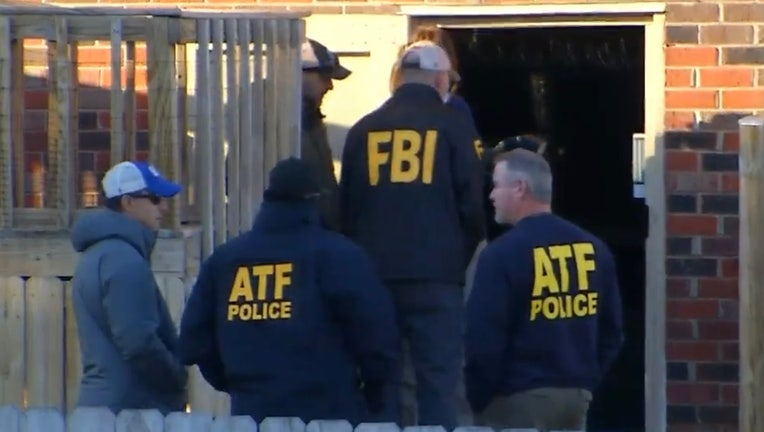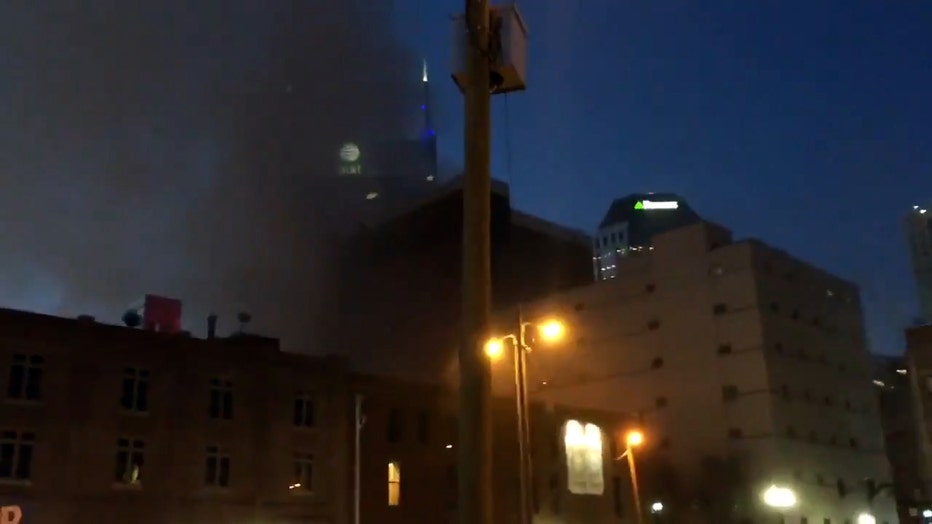FBI at home of possible person of interest in Nashville bomb

NASHVILLE, Tenn. - Federal investigators have identified a person of interest in connection with the explosion that rocked downtown Nashville on Christmas Day and were searching a home associated with that person, law enforcement officials said Saturday.
Investigators from multiple federal and local law enforcement agencies were at a home in Antioch, in suburban Nashville, after receiving information relevant to the investigation, said FBI Special Agent Jason Pack. Another law enforcement official, who was not authorized to discuss an ongoing investigation and spoke to The Associated Press on condition of anonymity, said investigators regard a person associated with the property as a person of interest in the bombing.
RELATED: Nashville, federal authorities investigating more than 500 tips in Christmas Day explosion
Earlier Saturday, investigators said at a news conference they are looking at a number of individuals who may be connected to the bombing but have also found no additional explosive devices- indicating no active threat to the area.
Douglas Korneski, the special agent in charge of the FBI’s Memphis field office, said 250 agents, analysts and FBI staff working the case are making progress in the search for the person or people responsible for planting a bomb in a recreational vehicle that exploded along a mostly deserted street. Three people were injured.
"It’s just going to take us some time," he said. "Our investigative team is turning over every stone" to understand who did this and why.
Separately, the Federal Emergency Management Agency said in a report Saturday that tissue samples found at the scene were determined to be human remains.
RELATED: Nashville officers recognized for evacuating residents before Christmas Day explosion
The attack that continued to wreak havoc on communications systems across the state. Police emergency systems in Tennessee, Kentucky and Alabama, as well as Nashville’s COVID-19 community hotline and a handful of hospital systems, remained out of service due to an AT&T central office being affected by the blast. The building contained a telephone exchange, with network equipment in it — but the company has declined to say exactly how many people have been impacted.
Investigators shutdown the heart of downtown Nashville’s tourist scene - an area packed with honky-tonks, restaurants and shops - as they shuffled through broken glass and damaged buildings to learn more about the explosion.
Mayor John Cooper has enforced a curfew in the downtown area until Sunday via executive order to limit public access to the area.
AT&T said restoration efforts are facing several challenges, which include a fire that "reignited overnight and led to the evacuation of the building." This has forced their teams to work with safety and structural engineers and drilling access holes into the building in order to reconnect power.
"Our teams continue to work around the clock on recovery efforts from yesterday morning’s explosion in Nashville," the company said in a Saturday statement. "We have two portable cell sites operating in downtown Nashville with numerous additional portable sites being deployed in the Nashville area and in the region."
Gov. Bill Lee asked the White House on Saturday for federal assistance due to the "severity and magnitude" of the explosion’s impact. At least 41 buildings were damaged, and communications systems — including residential and cell phone service and 911 call centers — failed across the state, he said. Kentucky and northern Alabama were also affected, he said.

Ray Neville, president of technology at T-Mobile, said on Twitter that service disruptions affected Louisville, Nashville, Knoxville, Birmingham and Atlanta. "We continue to see service interruptions in these areas following yesterday’s explosion. Restoration efforts continue around the clock & we will keep you updated on progress," he said in a tweet Saturday.
The outages had even briefly grounded flights at the Nashville International Airport, but service was continuing normally as of Saturday. The Federal Aviation Association has since issued a temporary flight restriction around the airport, requiring pilots to follow strict procedures until Dec. 30.
According to Metro Nashville Police Chief John Drake, police officers responded on Friday to a report of shots fired when they encountered the RV blaring a recorded warning that a bomb would detonate in 15 minutes. Police evacuated nearby buildings and called in the bomb squad. The RV exploded shortly afterward.
Law enforcement officials have said since shortly after the explosion occurred at around 6:30 a.m. that they believe the blast was intentional. They have not talked publicly about a possible target or motive.
RELATED: Nashville blast: Repairs begin on mangled communications systems
In West Virginia, a hospital system said Saturday that it was experiencing network connection issues directly related to the Nashville explosion. South Charleston-based Thomas Health, which operates two hospitals, said on its Facebook page that it didn’t have an estimated time of restoration.
Similarly, Sumner Regional Medical Center in Gallatin, Tennessee, said on its Facebook page that it was operating without access to some of its systems, including medical records.
"We prepare for situations like this and moved immediately to paper records. There has been no disruption to the delivery of patient care, and no cause for concern for this temporary issue," the center said in a post Friday.

